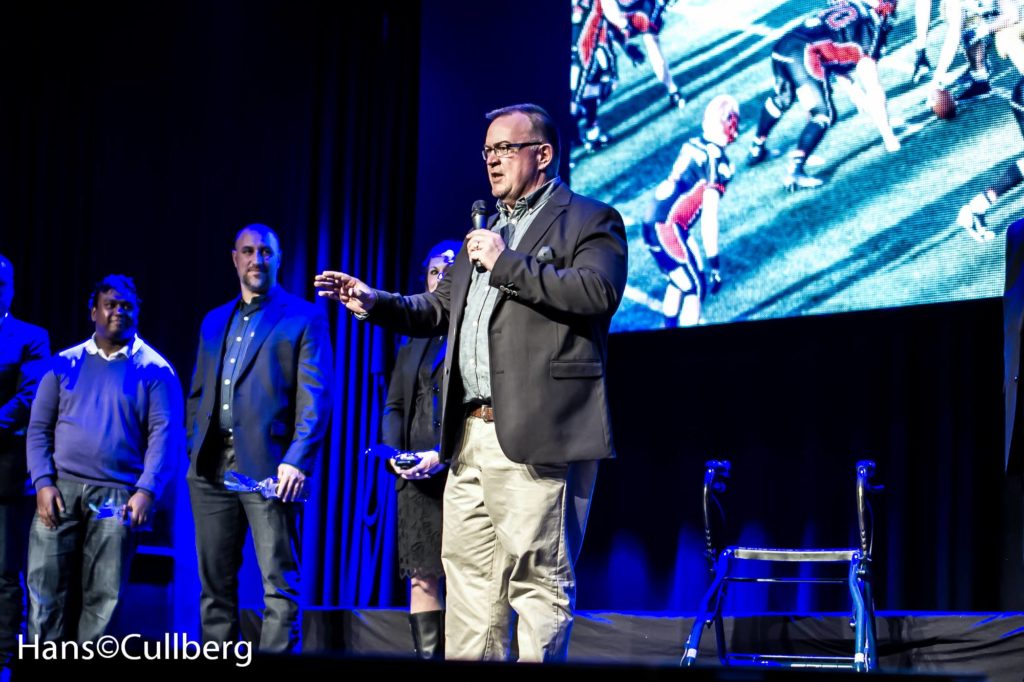On a recent trip to Sweden, I met with Billy “BD” Kennedy, offensive line coach of the reigning American football champions of Sweden, the Carlstad Crusaders. I met with BD after three separate people told me I needed to talk with him since I write about leadership. BD played and coached college football in the USA, including at Baylor, before he found himself moving to Sweden for personal reasons. In Sweden, the thriving European semi-pro American football scene soon discovered his talents. His resume includes winning the European championship in 2003. After sharing a coffee with BD for almost 2 hours, I realized why everyone said I needed to talk to him. Here are the 7 best leadership lessons I got from him that are applicable in the workplace outside football.
1) “Nobody wants to drop the ball” – Mistakes happen in football. Coaches have to learn to react to them in a constructive way. When a receiver drops a perfect pass, it doesn’t help to yell at him. He didn’t want to drop it. He wanted to catch it. You can’t motivate him more. You can’t change the outcome. What a coach can do is to reinforce the technique of catching a football to improve the odds in the future.
Leadership Lesson #1 -> Treat mistakes as learning moments by being constructive and forward-looking.
2) “Everybody has a role on the team” – Not everyone can throw, catch, run, block, cover, kick, or tackle enough to be a star on a football team. But everyone on an American football team in Europe sacrifices a lot to be part of the team. The key for a coach is to find how they can contribute. For some, it means being great in practice sessions during the week lining up against the starting team. Coaches need to coach those players to perform like their practice days are their game days. For others, it means learning every play just in case the starter gets hurt. The key to coaching is to figure out how the player can make an important contribution and help them do that and be proud of their contribution.
Kennedy coaching Sweden’s national team
Leadership Lesson #2 -> Find the way to make everyone feel valuable to the team.
3) “Find your team shuttle run” – At the beginning of one season, BD had his team end practices with a fitness routine that emphasized teamwork. Instead of sprints, he had everyone do shuttle runs, meaning they had to run to a yard line, touch it, turn around, sprint back to the goal line, and then run to the next line further down the field. He added a catch however. Every one on the team had to do it together, with arms interlocked. The team could only run as fast as their slowest player. After an awkward start, the team started to work together to come up with strategy to get faster every week to beat the coach’s challenge.
Leadership Lesson #3 -> Find an exercise that forces your team to work together toward a common goal.
4) “Find a reason to compliment every player” – Every amateur on the team volunteers to play and sacrifices their time, money and energy. They want to get positive feedback for their contributions, especially if they are not on the starting team. BD challenges his coaches to find something to compliment each player in every practice.
Leadership Lesson #4 -> Look for and seize any and all opportunities for positive feedback.
5) “Compete against yourself, not your competition” – Some coaches fire up their teams by pointing to provocative talk from the other team. Doing that lets the opponent set the battlefield and makes it a battle of negatives. BD chooses to motivate his players to compete against themselves. When they face opponents who talk more than perform, he challenges his team to respond by dominating them in execution. On the line, for example, that means moving the opponent even further than called for by the play and blocking scheme.
Kennedy coaching Carlstad Crusaders offensive line in 2015 Photo: Hans Cullberg
Leadership Lesson #5 -> Define your competition. Don’t let your competition define you.
6) “You win through your amateurs” – American football in Europe is typically semi-pro, meaning that a few paid, international recruits mix in with a team of local amateurs who volunteer to play. Getting the right international imports (typically American college players) is critical, but every opponent also has pros on their team. The pros largely cancel each other out. The place where coaches can make the biggest impact is by improving their amateurs. Since those players haven’t played at the top levels, they still have a lot to learn. Small investments in teaching them can pay big benefits, especially if it means they can effectively face off against the American imports.
Leadership Lesson #6 -> Focus on the people who need coaching, not the people you want to coach.
7) “Find ‘The Guy/Gal’” – Every industry has a person who knows everybody and serves as a connection hub. Finding and building a relationship with that person can provide a big boost to leaders in many ways. From recruiting and sales to research and partnerships, these connectors can be invaluable in finding new information and opportunities.
Leadership Lesson #7 -> Make a point to find and build a relationship with the person in your industry/field/etc who is the connector.
Sometimes, leadership lessons come from places you don’t expect. Meeting an extraordinary American football coach while traveling in Sweden reminded me of that earlier this month.

